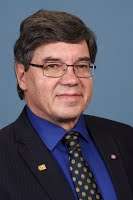Hausi A. Muller
| Hausi A. Müller | |
|---|---|
 | |
| Born |
August 11, 1955 Egg, Switzerland |
| Nationality | Canadian |
| Fields |
Software Evolution Self-adaptive System |
| Doctoral advisor | Ken Kennedy |
| Spouse | Ulrike Stege |
|
Website http://webhome.cs.uvic.ca/~hausi/ | |
Hausi A. Müller PhD, PEng, FCAE (born August 11, 1955 in Egg, Switzerland) is a Canadian computer scientist and software engineer. He is a professor of computer science at the University of Victoria, British Columbia, Canada and a Fellow of the Canadian Academy of Engineering.
He is known for his work in the fields of software evolution[1] and adaptive systems.[2][3][4] He was the lead architect of Rigi, an end-user programmable environment for software analysis, exploration, and visualization.[5][6]
He was General Chair of the ACM/IEEE International Conference on Software Engineering (ICSE 2001) in Toronto. He serves on the IEEE Computer Society Board of Governors (2015–17) and is Vice President of IEEE Computer Society Technical and Conferences Activities Board. He was Chair of IEEE Computer Society Technical Council on Software Engineering (TCSE) 2010-15.
Together with Kenny Wong he has provided an efficient implementation of Fortune's algorithm.
Awards and honors
- IEEE Computer Society Golden Core Member, 2016[7]
- Distinguished Service Award, IEEE Computer Society Technical Council on Software Engineering (TCSE), 2016
- Fellow Canadian Academy of Engineering (FCAE), 2012[8]
- Team Award: IBM Canada Project of the Year Award, IBM Center for Advanced Studies (CAS) Markham, Ontario, Canada, 2011
- IBM CAS Research Special Contributions Award, 2010
- IBM Faculty Fellow of the Year Award: IBM CAS Canada, 2006
- Canadian Consortium of Software Engineering Research (CSER) Outstanding Leadership Award, 2006
References
- ↑ Müller, Hausi; Villegas, Norha (2014-01-01). Mens, Tom; Serebrenik, Alexander; Cleve, Anthony, eds. Runtime Evolution of Highly Dynamic Software. Springer Berlin Heidelberg. pp. 229–264. doi:10.1007/978-3-642-45398-4_8. ISBN 9783642453977.
- ↑ Software Engineering for Self-Adaptive Systems II - Springer. doi:10.1007/978-3-642-35813-5.
- ↑ Villegas, Norha M.; Müller, Hausi A.; Tamura, Gabriel; Duchien, Laurence; Casallas, Rubby (2011-01-01). "A Framework for Evaluating Quality-driven Self-adaptive Software Systems". Proceedings of the 6th International Symposium on Software Engineering for Adaptive and Self-Managing Systems. SEAMS '11. New York, NY, USA: ACM: 80–89. doi:10.1145/1988008.1988020. ISBN 9781450305754.
- ↑ Brun, Yuriy; Serugendo, Giovanna Di Marzo; Gacek, Cristina; Giese, Holger; Kienle, Holger; Litoiu, Marin; Müller, Hausi; Pezzè, Mauro; Shaw, Mary (2009-01-01). Cheng, Betty H. C.; Lemos, Rogério de; Giese, Holger; Inverardi, Paola; Magee, Jeff, eds. Engineering Self-Adaptive Systems through Feedback Loops. Lecture Notes in Computer Science. Springer Berlin Heidelberg. pp. 48–70. doi:10.1007/978-3-642-02161-9_3. ISBN 9783642021602.
- ↑ Muller, H. A.; Klashinsky, K. (1988-04-01). "Rigi: a system for programming-in-the-large". , Proceedings of the 10th International Conference on Software Engineering, 1988: 80–86. doi:10.1109/ICSE.1988.93690.
- ↑ Kienle, Holger M.; Müller, Hausi A. (2010-04-01). "Rigi—An environment for software reverse engineering, exploration, visualization, and redocumentation". Science of Computer Programming. Experimental Software and Toolkits (EST 3): A special issue of the Workshop on Academic Software Development Tools and Techniques (WASDeTT 2008). 75 (4): 247–263. doi:10.1016/j.scico.2009.10.007.
- ↑ "IEEE Computer Society Golden Core Award".
- ↑ "List of Fellows of the Canadian Academy of Engineering".
External links
- Official website at the University of Victoria
- Citations on Google Scholar
- Publications list on DBLP
- IEEE Computer Society Learning Webinar on Conferences, 2016